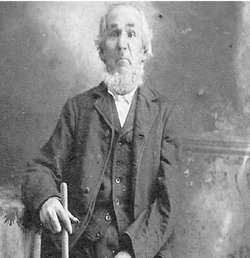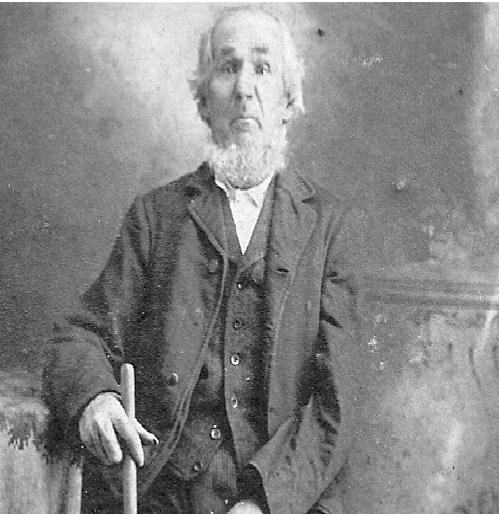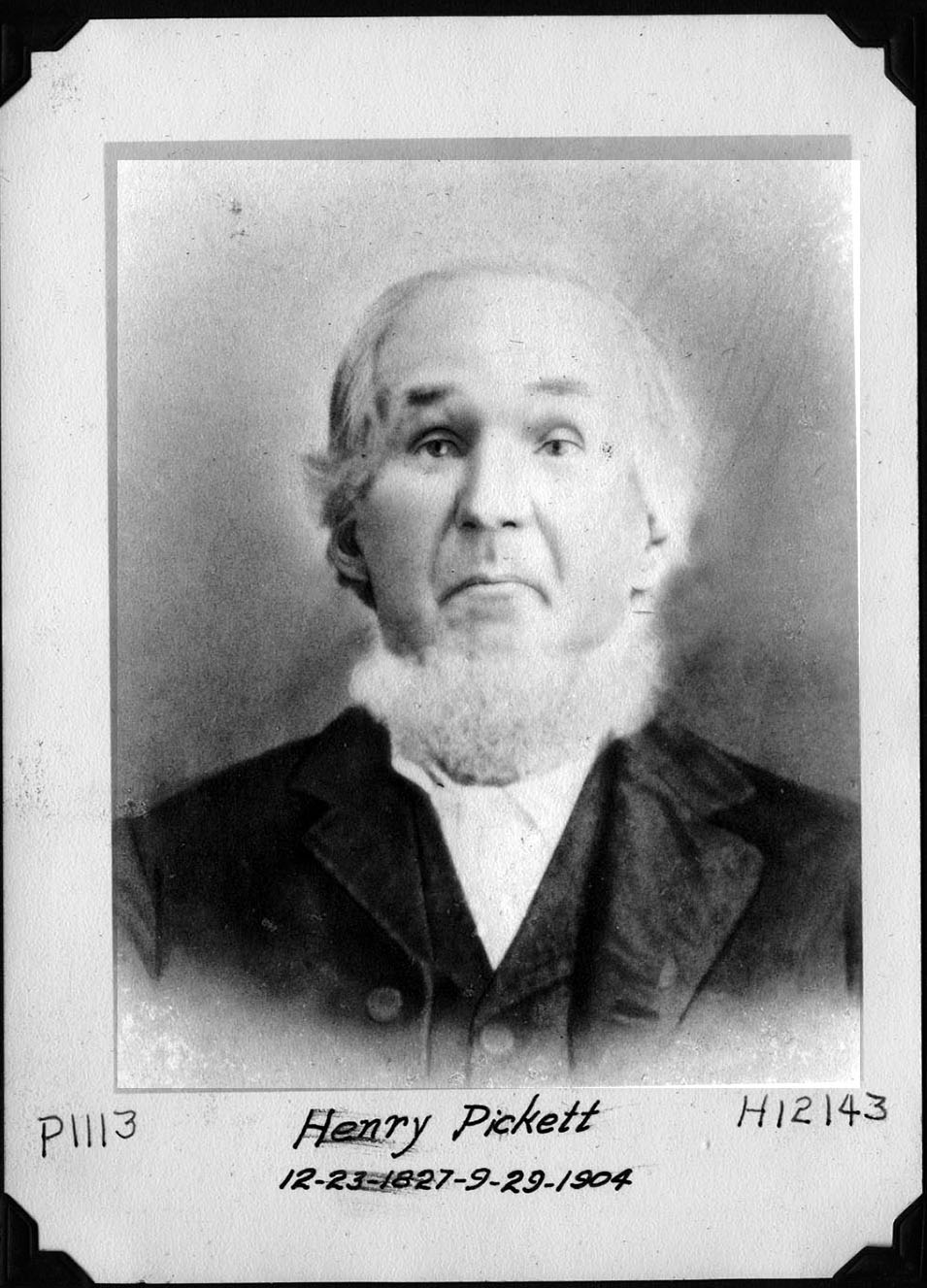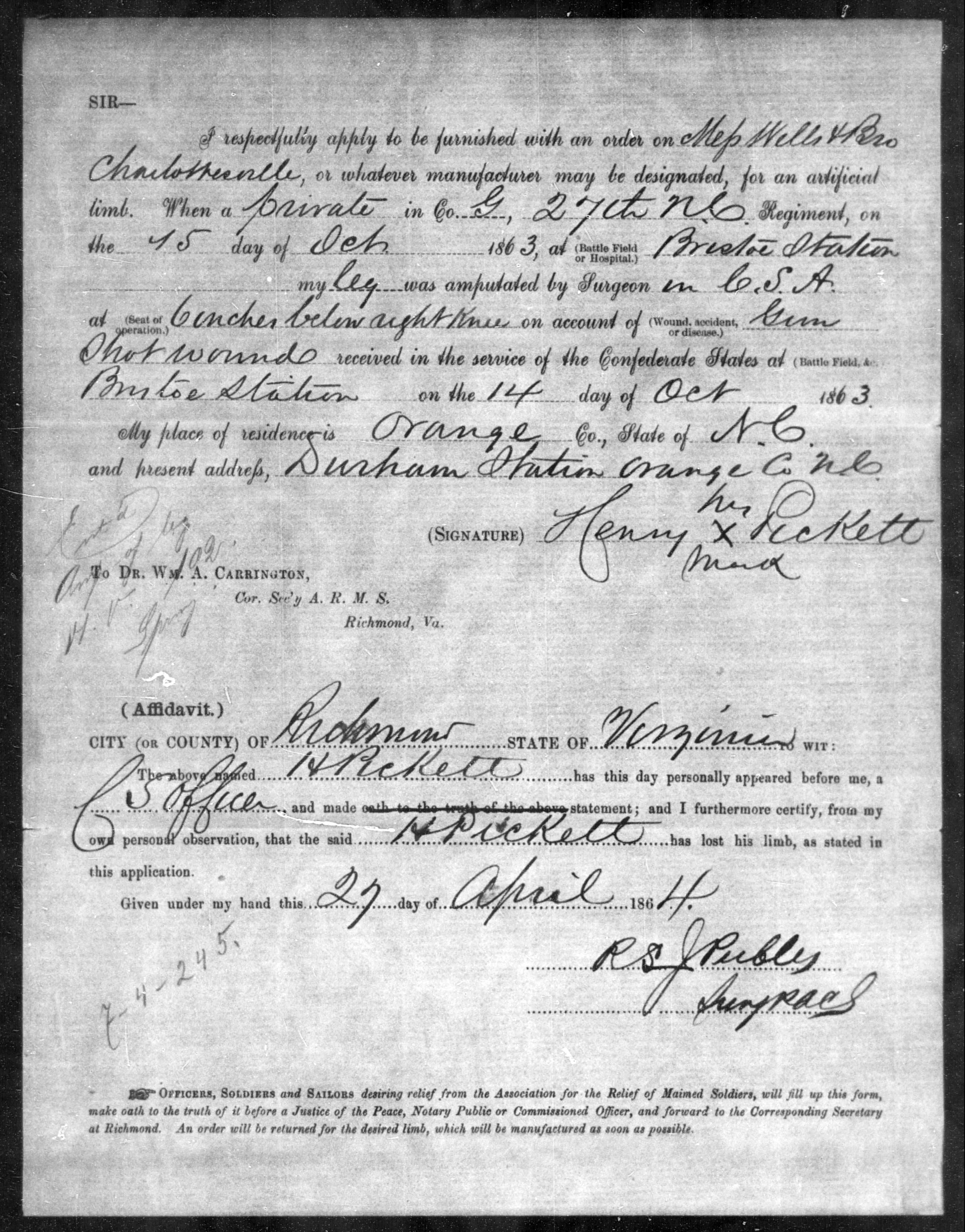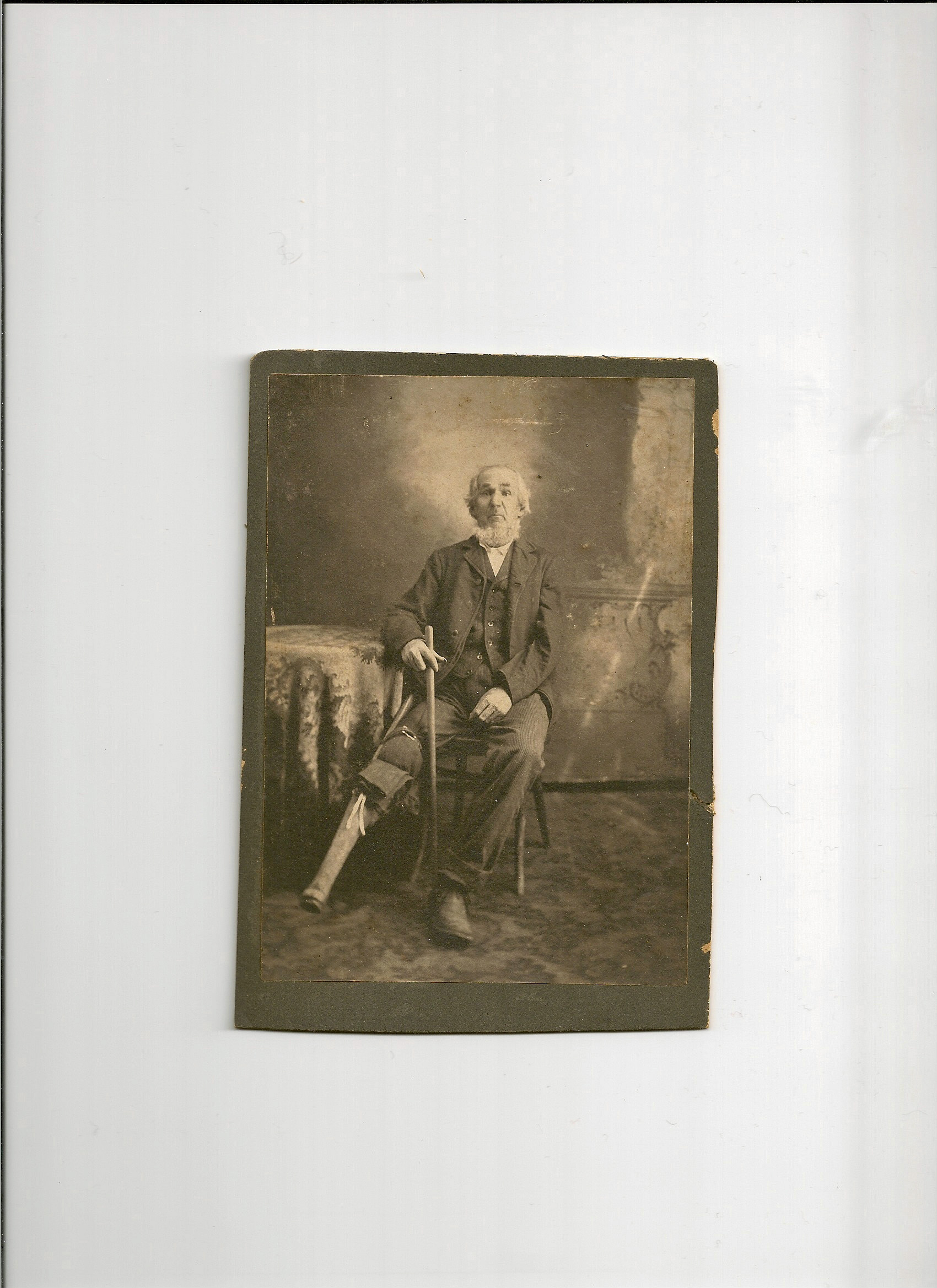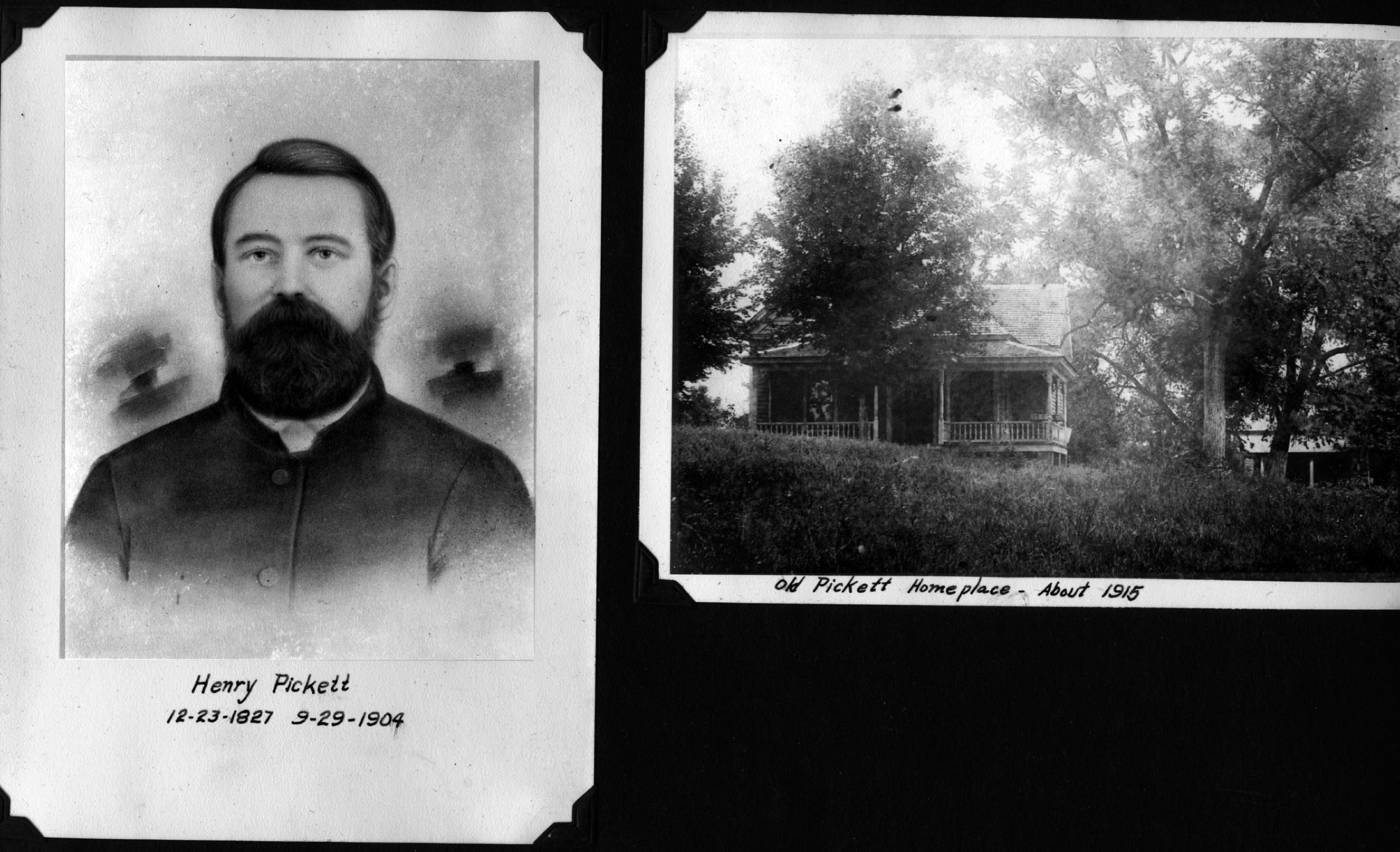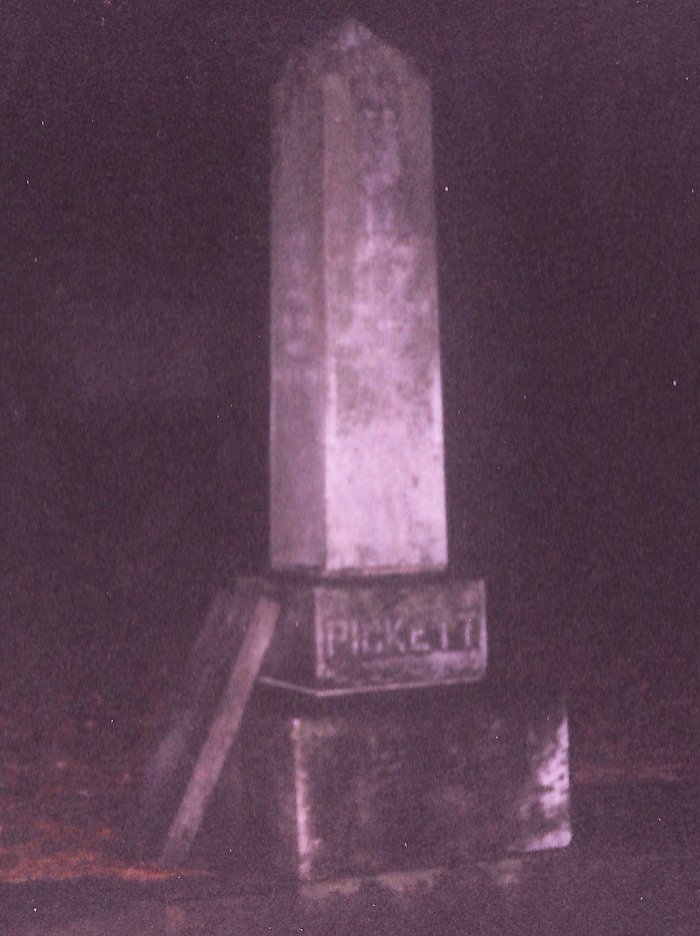Prior to the war was married to Martha Carolyn Rigsbee, daughter of Jesse Rigsbee and Mary Vickers, on March 25, 1851. They had 4 children. On June 11,1861, Martha Caroline died of pneumonia contracted after sitting on the ground with their youngest child while watching Henry plow.
Henry Pickett of Durham Station, Orange County (now Durham County) N.C., at the age of 33, enlisted in the Orange Guards ("A" Company) 9th North Carolina Volunteers for a period of 1 year on July 17, 1861.
The 9th NC Volunteers mobilized and re-designated 27th Regiment, North Carolina (Inf.) in September 1861. On July 17, 1862 transferred to Company G, 27th North Carolina State Troops.
The 27th Regiment remained in defense of New Bern until the city was captured on March 14, 1862, by General Burnsides' troops accompanied by Union gunboats. The 27th withdrew to Kinston and then moved to Richmond on May 31, 1862 to take part in the battles for the Defense of Richmond.
They arrived on June 1 in time to see the final outcome of the Battle of Seven Pines but was not engaged in this battle. They remained in defense of Petersburg and later moved to Richmond and fought in the Seven Days Battle at Malvern Hill, Drewery's Bluff, and Cold Harbor during the period June 26 - July 2.
They took part in the many engagements for the defense of Petersburg and departed on August 26, 1862, for Rapidan Station and from there started on the first Maryland Campaign on September 1.
They were attached to Longstreet's Corps on 9 September and went into position on September 10th east of Bucket Town near Harpers Ferry.
After the battle of Harper's Ferry they moved to Sharpsburg and were on the extreme right of the Confederate line on September 17 at "Bloody Lane." More men were killed on this day than any day of the war.
The 27th NC and the 3rd Arkansas Regiment were detached from the Division and fought as a Brigade under Colonel Cooke. The next day the enemy dead were piled 2 or 3 deep in front of their position in some places. "G" Company went into battle that day with 30 men and at the end of the day had 5 men left.
On September 19 they marched to Martinsburg, Virginia, where they remained until the last of September and then moved to Winchester and arrived at Fredericksburg about the end of November 1862.
Cooke was promoted to Brigadeer General in November. The 27th was engaged in the battle of Fredericksburg on December 13 and fought behind the rock wall at Marye's Height. Cooke was wounded at the rock wall while talking to Gen. Cobb of Georgia who was killed there.
Cooke's Brigade was then ordered south on January 3 arriving in the field at Wilmington on January 21, 1863. It moved to the defense of Charleston on February 22. The Brigade returned to Richmond and was assigned to Heths Division of A.P. Hills Corps on May 30.
Due to a succession of alarms, Cooke's Brigade was placed in defense of Richmond and was not with Hill at Gettysburg.
It remained in defense of Richmond until October 1 when it departed for Gordonsville and rejoined Heths Division on October 8 and arrived at Warrenton on October 13. Hills III Corps and Ewells II Corps started in pursuit of Meades Second Corps on his right front which was concealed by the embankment of the Orange and Alexander Railroad near Bristoe Station.
Cooke's Brigade was on the right flank and as he advanced to cross Broad Run his entire right flank was exposed to Union Fire from the railroad embankment and from Union Artillery in a good position in rear of the railroad track. These Union forces had set a trap for the advancing Confederate forces. Cooke's Brigade was slaughtered. General Cooke was severely wounded. Colonel Hall assumed command and ordered a charge down the railroad embankment. Men were falling at almost every step. The magnificent Twenty-Seventh North Carolina which had earned immortality at Sharpsburg sacrificed thirty-three of its officers and 290 of its 416 men.
Private Pickett was wounded by Union artillery in this battle near Bristoe Station, Virginia, on October 14, 1863, and was admitted to General Hospital No. 24 at Richmond on October 18.
His right leg was amputated 6 inches below the knee on October 19. He was placed on 60 days furlough on November 18, 1863 and admitted to Jackson Hospital, Richmond, Virginia, on April 28, 1864 and transferred to Camp Winder on May 8, 1864. He was admitted to C.S.A. General Hospital, Charlottesville on June 4 and transferred to General Hospital No.9, Richmond on July 17, 1864.
After the war, was remarried to Ellen Jane McCauley, daughter of John McCauley and Margaret Blackwood, on 6 January 1866 and became the father of four additional children. His youngest child, Richard Johnson Pickett, is my great grandfather.
Henry transferred his membership from Durham's First Baptist Church to become a charter member of Yates Baptist Church on 20 April 1878 and served as its first treasurer.
The back nine of the Washington Duke golf course occupies his former farm of 95 acres sold to Murray Jones, a front man for James Buchanan Duke, on 26 March 1926.
( Bio by: Dick Pickett )
~~~~~~~~~~~~~~~~~~~~~~~~~~~~~~~~~~~~~~
Prior to the war was married to Martha Carolyn Rigsbee, daughter of Jesse Rigsbee and Mary Vickers, on March 25, 1851. They had 4 children. On June 11,1861, Martha Caroline died of pneumonia contracted after sitting on the ground with their youngest child while watching Henry plow.
Henry Pickett of Durham Station, Orange County (now Durham County) N.C., at the age of 33, enlisted in the Orange Guards ("A" Company) 9th North Carolina Volunteers for a period of 1 year on July 17, 1861.
The 9th NC Volunteers mobilized and re-designated 27th Regiment, North Carolina (Inf.) in September 1861. On July 17, 1862 transferred to Company G, 27th North Carolina State Troops.
The 27th Regiment remained in defense of New Bern until the city was captured on March 14, 1862, by General Burnsides' troops accompanied by Union gunboats. The 27th withdrew to Kinston and then moved to Richmond on May 31, 1862 to take part in the battles for the Defense of Richmond.
They arrived on June 1 in time to see the final outcome of the Battle of Seven Pines but was not engaged in this battle. They remained in defense of Petersburg and later moved to Richmond and fought in the Seven Days Battle at Malvern Hill, Drewery's Bluff, and Cold Harbor during the period June 26 - July 2.
They took part in the many engagements for the defense of Petersburg and departed on August 26, 1862, for Rapidan Station and from there started on the first Maryland Campaign on September 1.
They were attached to Longstreet's Corps on 9 September and went into position on September 10th east of Bucket Town near Harpers Ferry.
After the battle of Harper's Ferry they moved to Sharpsburg and were on the extreme right of the Confederate line on September 17 at "Bloody Lane." More men were killed on this day than any day of the war.
The 27th NC and the 3rd Arkansas Regiment were detached from the Division and fought as a Brigade under Colonel Cooke. The next day the enemy dead were piled 2 or 3 deep in front of their position in some places. "G" Company went into battle that day with 30 men and at the end of the day had 5 men left.
On September 19 they marched to Martinsburg, Virginia, where they remained until the last of September and then moved to Winchester and arrived at Fredericksburg about the end of November 1862.
Cooke was promoted to Brigadeer General in November. The 27th was engaged in the battle of Fredericksburg on December 13 and fought behind the rock wall at Marye's Height. Cooke was wounded at the rock wall while talking to Gen. Cobb of Georgia who was killed there.
Cooke's Brigade was then ordered south on January 3 arriving in the field at Wilmington on January 21, 1863. It moved to the defense of Charleston on February 22. The Brigade returned to Richmond and was assigned to Heths Division of A.P. Hills Corps on May 30.
Due to a succession of alarms, Cooke's Brigade was placed in defense of Richmond and was not with Hill at Gettysburg.
It remained in defense of Richmond until October 1 when it departed for Gordonsville and rejoined Heths Division on October 8 and arrived at Warrenton on October 13. Hills III Corps and Ewells II Corps started in pursuit of Meades Second Corps on his right front which was concealed by the embankment of the Orange and Alexander Railroad near Bristoe Station.
Cooke's Brigade was on the right flank and as he advanced to cross Broad Run his entire right flank was exposed to Union Fire from the railroad embankment and from Union Artillery in a good position in rear of the railroad track. These Union forces had set a trap for the advancing Confederate forces. Cooke's Brigade was slaughtered. General Cooke was severely wounded. Colonel Hall assumed command and ordered a charge down the railroad embankment. Men were falling at almost every step. The magnificent Twenty-Seventh North Carolina which had earned immortality at Sharpsburg sacrificed thirty-three of its officers and 290 of its 416 men.
Private Pickett was wounded by Union artillery in this battle near Bristoe Station, Virginia, on October 14, 1863, and was admitted to General Hospital No. 24 at Richmond on October 18.
His right leg was amputated 6 inches below the knee on October 19. He was placed on 60 days furlough on November 18, 1863 and admitted to Jackson Hospital, Richmond, Virginia, on April 28, 1864 and transferred to Camp Winder on May 8, 1864. He was admitted to C.S.A. General Hospital, Charlottesville on June 4 and transferred to General Hospital No.9, Richmond on July 17, 1864.
After the war, was remarried to Ellen Jane McCauley, daughter of John McCauley and Margaret Blackwood, on 6 January 1866 and became the father of four additional children. His youngest child, Richard Johnson Pickett, is my great grandfather.
Henry transferred his membership from Durham's First Baptist Church to become a charter member of Yates Baptist Church on 20 April 1878 and served as its first treasurer.
The back nine of the Washington Duke golf course occupies his former farm of 95 acres sold to Murray Jones, a front man for James Buchanan Duke, on 26 March 1926.
( Bio by: Dick Pickett )
~~~~~~~~~~~~~~~~~~~~~~~~~~~~~~~~~~~~~~
